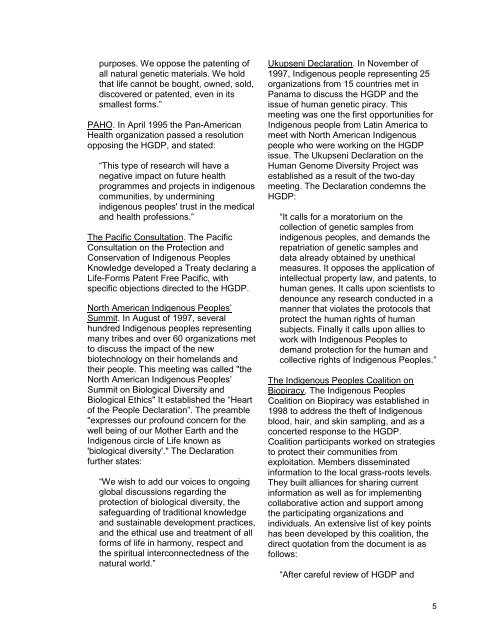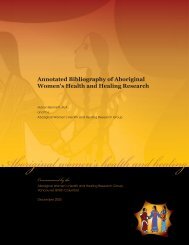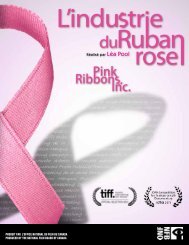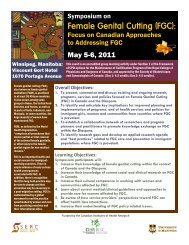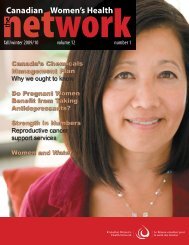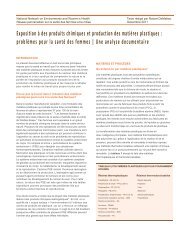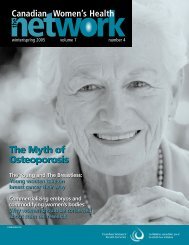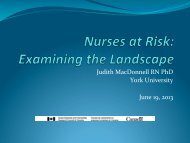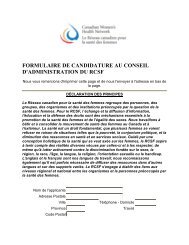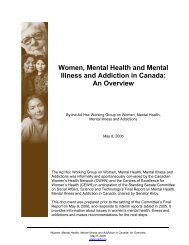from Priscilla Settee - Canadian Women's Health Network
from Priscilla Settee - Canadian Women's Health Network
from Priscilla Settee - Canadian Women's Health Network
- No tags were found...
You also want an ePaper? Increase the reach of your titles
YUMPU automatically turns print PDFs into web optimized ePapers that Google loves.
purposes. We oppose the patenting ofall natural genetic materials. We holdthat life cannot be bought, owned, sold,discovered or patented, even in itssmallest forms.”PAHO. In April 1995 the Pan-American<strong>Health</strong> organization passed a resolutionopposing the HGDP, and stated:“This type of research will have anegative impact on future healthprogrammes and projects in indigenouscommunities, by underminingindigenous peoples' trust in the medicaland health professions.”The Pacific Consultation. The PacificConsultation on the Protection andConservation of Indigenous PeoplesKnowledge developed a Treaty declaring aLife-Forms Patent Free Pacific, withspecific objections directed to the HGDP.North American Indigenous Peoples’Summit. In August of 1997, severalhundred Indigenous peoples representingmany tribes and over 60 organizations metto discuss the impact of the newbiotechnology on their homelands andtheir people. This meeting was called "theNorth American Indigenous Peoples’Summit on Biological Diversity andBiological Ethics" It established the “Heartof the People Declaration”. The preamble"expresses our profound concern for thewell being of our Mother Earth and theIndigenous circle of Life known as'biological diversity'." The Declarationfurther states:“We wish to add our voices to ongoingglobal discussions regarding theprotection of biological diversity, thesafeguarding of traditional knowledgeand sustainable development practices,and the ethical use and treatment of allforms of life in harmony, respect andthe spiritual interconnectedness of thenatural world.”Ukupseni Declaration. In November of1997, Indigenous people representing 25organizations <strong>from</strong> 15 countries met inPanama to discuss the HGDP and theissue of human genetic piracy. Thismeeting was one the first opportunities forIndigenous people <strong>from</strong> Latin America tomeet with North American Indigenouspeople who were working on the HGDPissue. The Ukupseni Declaration on theHuman Genome Diversity Project wasestablished as a result of the two-daymeeting. The Declaration condemns theHGDP:“It calls for a moratorium on thecollection of genetic samples <strong>from</strong>indigenous peoples, and demands therepatriation of genetic samples anddata already obtained by unethicalmeasures. It opposes the application ofintellectual property law, and patents, tohuman genes. It calls upon scientists todenounce any research conducted in amanner that violates the protocols thatprotect the human rights of humansubjects. Finally it calls upon allies towork with Indigenous Peoples todemand protection for the human andcollective rights of Indigenous Peoples.”The Indigenous Peoples Coalition onBiopiracy. The Indigenous PeoplesCoalition on Biopiracy was established in1998 to address the theft of Indigenousblood, hair, and skin sampling, and as aconcerted response to the HGDP.Coalition participants worked on strategiesto protect their communities <strong>from</strong>exploitation. Members disseminatedinformation to the local grass-roots levels.They built alliances for sharing currentinformation as well as for implementingcollaborative action and support amongthe participating organizations andindividuals. An extensive list of key pointshas been developed by this coalition, thedirect quotation <strong>from</strong> the document is asfollows:“After careful review of HGDP and5


